Did you know that certain herbal teas have been used for centuries to enhance cognitive function and promote mental clarity? In today’s fast-paced world, maintaining focus and clarity is crucial for productivity and overall well-being. Herbal teas offer a natural solution, with various options available to suit different needs and preferences.
We will explore the top 10 teas known for their brain-boosting properties, discussing their biochemical effects and how they can be incorporated into your daily routine for improved concentration and overall brain health.
Key Takeaways
- Discover the top 10 herbal teas that enhance mental clarity and focus.
- Learn how these teas work on a biochemical level to boost brain function.
- Understand the benefits of incorporating these teas into your daily routine.
- Explore both caffeinated and caffeine-free options to suit your lifestyle.
- Get practical tips on preparing and consuming these teas for maximum cognitive benefits.
The Science Behind Herbal Teas and Cognitive Function
Recent research has begun to uncover the mechanisms by which herbal teas influence cognitive processes. Herbal teas contain a variety of bioactive compounds that may benefit overall brain health. These compounds include antioxidants, antiviral and antibacterial agents, and herbs that may reduce inflammation and the risk of blood clots and high blood pressure.
One of the key ways herbal teas support cognitive function is through their interaction with neurotransmitters and receptors in the brain. The bioactive compounds in these teas can cross the blood-brain barrier, exerting their effects directly on the brain. For instance, green tea contains a potent combination of caffeine and L-theanine, making it a great study aid that can help boost brainpower and induce a state of calm and focus.
Mechanisms of Herbal Compounds on Brain Chemistry
Herbal compounds in tea affect brain chemistry in several ways. Flavonoids, terpenes, and other plant compounds play a crucial role in enhancing cognitive function. These compounds can increase blood flow to the brain, delivering more oxygen and nutrients to support optimal brain function.
| Herbal Compound | Effect on Brain | Cognitive Benefit |
|---|---|---|
| Flavonoids | Cross blood-brain barrier | Improved memory |
| L-theanine | Promotes relaxation | Enhanced focus |
| Caffeine | Stimulates alertness | Better concentration |
Studies have shown that certain herbal teas can have a measurable effect on brain wave activity, memory formation, and information processing. The synergistic properties of multiple compounds working together in herbal teas often make them more effective than isolated compounds.
By understanding how herbs and their compounds interact with our brain chemistry, we can better appreciate the potential benefits of herbal teas for overall brain health. As research continues to uncover the complexities of these interactions, it becomes increasingly clear that herbal teas can be a valuable addition to a cognitive health regimen.
How Herbal Compounds Affect Brain Chemistry
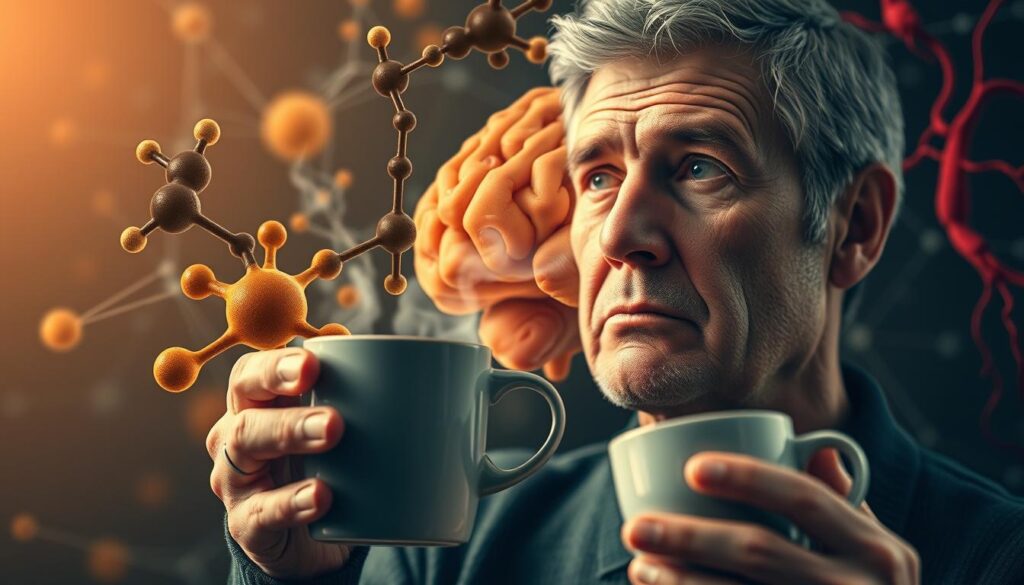
Herbal teas contain a multitude of compounds that can positively affect brain chemistry, leading to improved mental performance. Green tea, for instance, is made from the Camellia sinensis plant and contains a potent combination of caffeine and L-theanine, making it an excellent study aid that boosts brainpower and induces a state of calm and focus.
The Role of Antioxidants in Mental Performance
Antioxidants play a crucial role in maintaining brain health by combating oxidative stress, which is linked to cognitive decline and neurodegenerative diseases. Herbal teas, particularly green tea, are rich in antioxidants such as EGCG, a catechin that may be beneficial for learning and memory.
The effect of herbal compounds on brain chemistry is multifaceted:
- L-theanine in green tea can alter brain wave patterns to promote a state of relaxed alertness ideal for focused work.
- Antioxidants in herbal teas reduce oxidative stress in the brain, supporting overall health.
- Certain herbal compounds modulate neurotransmitters like dopamine, serotonin, and GABA to improve mood, focus, and cognitive performance.
- The anti-inflammatory properties of many herbal teas help reduce neuroinflammation, supporting better brain function.
| Herbal Compound | Effect on Brain Chemistry | Benefit |
|---|---|---|
| L-theanine | Alters brain wave patterns | Promotes relaxed alertness |
| EGCG | Reduces oxidative stress | Supports learning and memory |
| Antioxidants | Combats oxidative stress | Supports overall brain health |
Regular consumption of herbal teas can have cumulative effects on brain health, including potential neuroprotective benefits for long-term cognitive function. By understanding how herbal compounds affect brain chemistry, we can better appreciate the health benefits of incorporating these teas into our daily routine.
Benefits of Drinking Herbal Teas for Mental Clarity
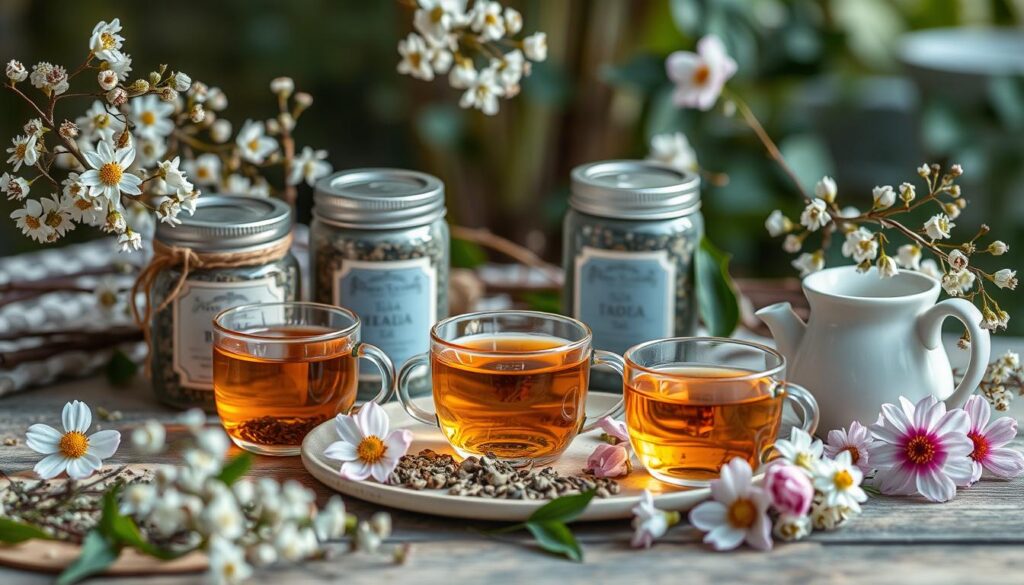
The benefits of herbal teas for mental clarity are multifaceted and supported by emerging research. Drinking a cup of herbal tea each day may help protect your health in the long term and reduce stress levels.
Immediate Effects on Focus and Alertness
Certain herbal teas can have immediate cognitive benefits, including enhanced alertness and improved concentration. For instance, the caffeine in some herbal teas works synergistically with other plant compounds to provide a smoother, more sustained focus without the jitters or crash associated with coffee.
Aromatic compounds in teas like peppermint and rosemary can enhance cognitive performance through both consumption and inhalation of their vapors. A 2018 study suggests that even just inhaling tea aroma — black tea, specifically — may help lower stress levels and produce a calmer mood.
Herbal teas play a significant role in reducing mental fatigue, helping maintain productivity throughout the day. Different herbal teas can be strategically consumed at different times of day to optimize mental performance based on your schedule and needs.
Certain herbal teas can help clear “brain fog” and improve mental clarity during challenging cognitive tasks. For example, a 2021 study found that lemon balm, which can be consumed in tea blends, may be effective for improving feelings of stress, anxiety, and depression, though more research is needed.
By incorporating herbal teas into your daily routine, you can experience these benefits firsthand. Whether you’re looking to enhance your focus, reduce stress, or simply enjoy a moment of calm, there’s an herbal tea that can meet your needs.
Long-term Benefits for Brain Health
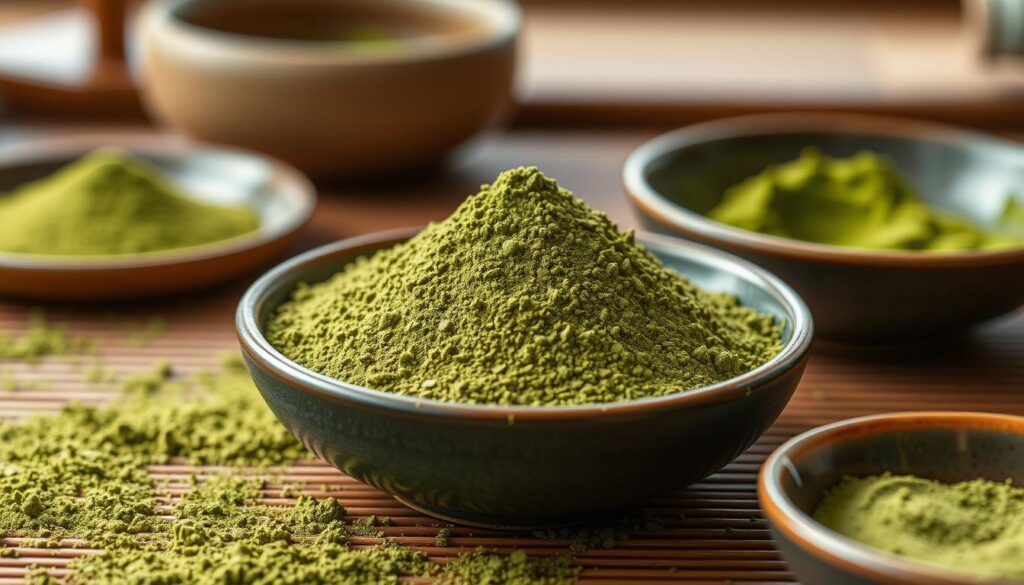
Herbal teas have been found to provide numerous long-term benefits that support overall brain health and cognitive function. Regular consumption of certain herbal teas can contribute to long-term brain health and potentially reduce the risk of cognitive decline.
Green Tea: A Brain-Boosting Beverage
Green tea is particularly noteworthy for its high content of polyphenol antioxidants, which are known to offer many health benefits, including protection against oxidative stress. This stress can damage cells and is linked to various health issues, including cognitive decline.
The amino acid L-theanine in green tea works synergistically with caffeine to improve brain functions such as mood, memory, and reaction time. Research has shown that green tea may benefit health in other ways, including heart health and reducing the risk of heart disease in certain groups.
The neuroprotective properties of compounds found in green tea, particularly EGCG (epigallocatechin gallate), have been shown to protect brain cells from damage. EGCG is a powerful antioxidant that combats oxidative stress in the brain, which is linked to age-related cognitive decline and neurodegenerative diseases.
Regular consumption of green tea may support neuroplasticity and neurogenesis, the formation of new brain cells, which is crucial for maintaining cognitive function as we age. Population studies suggest correlations between regular tea consumption and reduced risk of cognitive impairment in older adults.
Furthermore, certain herbal compounds may help maintain the integrity of the blood-brain barrier, which is crucial for overall brain health. By supporting this barrier, herbal teas can play a role in protecting the brain from harmful substances.
As we continue to explore the benefits of herbal teas, it’s clear that incorporating them into our daily routine can have significant long-term benefits for our brain health and overall well-being.
L-Theanine and Caffeine: The Perfect Cognitive Combo

The synergy between L-theanine and caffeine in green tea creates a potent cognitive boost that enhances focus and clarity. This unique combination is what makes green tea an effective aid for mental performance.
EGCG and Its Role in Brain Function
Green tea contains high amounts of EGCG (epigallocatechin gallate), a catechin that plays a significant role in protecting brain cells and supporting neuroplasticity. EGCG’s antioxidant properties help in maintaining brain health, which is crucial for cognitive functions like memory and learning.
Research studies have shown that EGCG may have a positive effect on brain function, potentially improving mood, memory, and reaction time. The combination of EGCG with L-theanine and caffeine in green tea creates a powerful cognitive-enhancing effect.
How to Brew Green Tea for Maximum Benefits
To maximize the extraction of beneficial compounds from green tea, it’s essential to brew it correctly. Use hot water at a temperature of around 160°F to 170°F. Steep the tea for 1 to 3 minutes, depending on your preference for strength and flavor.
The processing methods of green tea can affect its cognitive-enhancing properties. Varieties like Matcha, where the entire leaf is consumed, may contain higher levels of beneficial compounds compared to steeped green tea.
Matcha: Concentrated Mental Power
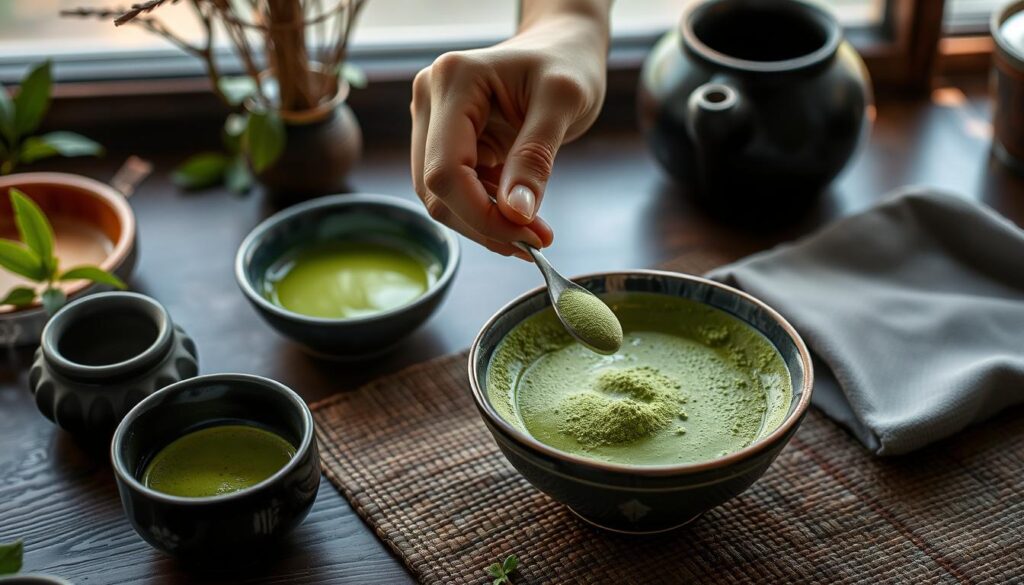
As a concentrated form of green tea, matcha offers numerous cognitive benefits. Produced from shade-grown tea leaves that are stone-ground into a fine powder, matcha contains a higher concentration of beneficial compounds compared to regular green tea.
Unique Production Process
Matcha’s unique production process involves shade-growing the tea plants, which increases the chlorophyll and caffeine content. The leaves are then ground into a fine powder, allowing consumers to ingest the entire leaf, thereby benefiting from a more potent dose of antioxidants and L-theanine.
The combination of caffeine and L-theanine in matcha works synergistically to improve cognitive function and clarity. While caffeine provides a gentle boost of energy, L-theanine promotes a state of calm and focus, making matcha an ideal tea for aiding studying and boosting brain power.
Sustained Energy and Cognitive Support
Unlike coffee, which can cause a rapid spike and crash in energy levels, matcha provides sustained energy without the crash. This makes it particularly beneficial for individuals requiring prolonged mental focus and clarity.
To incorporate matcha into your daily routine, you can enjoy it not only as a traditional tea but also in lattes, smoothies, or as an ingredient in baked goods. The versatility of matcha makes it easy to reap its benefits in various ways.
Selecting Quality Matcha
When choosing matcha, it’s essential to consider the quality. High-quality matcha is characterized by its vibrant green color and fine texture. Opting for ceremonial or premium grade matcha ensures that you’re getting a product rich in the beneficial compounds that support brain health.
By incorporating matcha into your daily routine, you can experience a natural boost in mental clarity and focus, making it an excellent addition to your lifestyle.
Peppermint Tea: The Natural Focus Enhancer

Peppermint, a common medicinal herb, offers a caffeine-free alternative for enhancing mental focus and alertness through its natural aromatic compounds. Studies have shown that peppermint may enhance memory and increase alertness, making it a great tea for when you need to be on your mental A-game.
How Peppermint Improves Memory and Alertness
The menthol and other compounds in peppermint stimulate the hippocampus, the brain region associated with memory formation and retrieval. This stimulation can lead to improved performance in cognitive tasks and sustained attention.
Research has indicated that the aromatic compounds in peppermint tea can enhance concentration and memory. By consuming peppermint tea, individuals can potentially improve their mental clarity and focus.
Aromatherapy Benefits for Concentration
In addition to its cognitive benefits when consumed, peppermint tea also offers aromatherapy benefits. The inhalation of peppermint’s aromatic compounds can enhance concentration and mental clarity, providing a dual benefit.
The aroma of peppermint has been shown to be invigorating, helping to reduce mental fatigue and improve focus. This makes peppermint tea an excellent choice for those looking to boost their mental performance.
Best Times to Drink Peppermint Tea
For maximum cognitive benefits, peppermint tea can be consumed during afternoon energy slumps or before tasks requiring sustained attention. Its caffeine-free nature makes it an ideal choice for any time of day without disrupting sleep patterns.
Peppermint tea can also be combined with other herbs or teas to create synergistic blends for enhanced cognitive performance. Experimenting with different blends can help individuals find the perfect combination to suit their cognitive needs.
Ginger Tea: Stimulating Brain Circulation
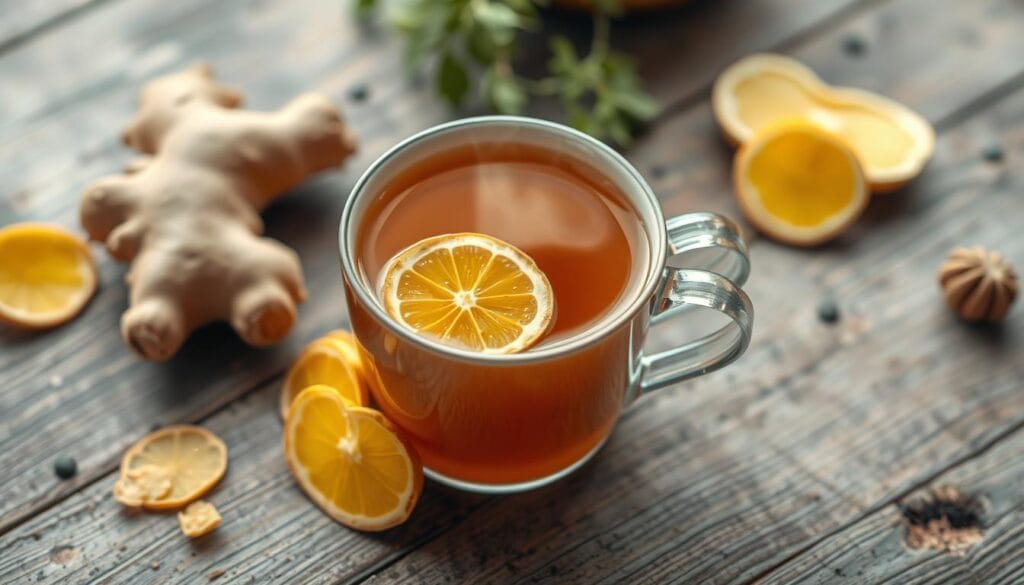
The stimulating effects of ginger tea on brain circulation make it an excellent choice for those seeking mental clarity. Ginger has been used for centuries to treat various health issues, including nausea and cramping, and its benefits extend to enhancing cognitive function.
Anti-inflammatory Properties and Cognitive Function
Ginger’s potent anti-inflammatory compounds, including gingerols and shogaols, play a crucial role in reducing neuroinflammation, which can impair cognitive function and contribute to brain fog. By minimizing inflammation, ginger tea supports overall brain health.
Ginger’s Effect on Mental Fatigue
Ginger tea can help combat mental fatigue and restore alertness, particularly during long work sessions or when recovering from illness. Its thermogenic properties can increase energy expenditure and potentially boost mental energy, making it an ideal beverage for those seeking to enhance their mental performance.
Combining Ginger with Other Brain-Boosting Herbs
Combining ginger with other brain-boosting herbs like turmeric, rosemary, or peppermint can create synergistic blends for enhanced cognitive benefits. For example, mixing ginger with turmeric can amplify its anti-inflammatory effects, while combining it with peppermint can enhance its refreshing and invigorating properties.
To make ginger tea, simply boil peeled ginger root in milk or water. You can also combine it with other herbs to create a unique blend that suits your taste preferences. Whether you prefer it sweet or spicy, ginger tea is a versatile beverage that can be tailored to your needs.
Rosemary Tea: The Memory Enhancer

Rosemary tea, derived from the herb known for its culinary and medicinal properties, is emerging as a leading cognitive enhancer. This herbal tea is not just a flavorful addition to your daily routine but a potent tool for improving memory and cognitive function.
A Rich History of Cognitive Enhancement
Rosemary has been used for centuries to enhance memory and cognitive function. In ancient Greece, students would wear rosemary garlands during exams to improve their memory. This historical use underscores the herb’s significance in supporting brain health.
The active compounds in rosemary, particularly carnosic acid and rosmarinic acid, have been shown to have neuroprotective properties. These compounds support brain health through their antioxidant and anti-inflammatory actions, potentially enhancing memory retention and cognitive processing.
Active Compounds Supporting Brain Health
Studies have identified that the compounds in rosemary tea can improve cognitive functions. The presence of rosmarinic acid and carnosic acid contributes to the tea’s ability to enhance memory and cognitive performance. Drinking rosemary tea made with hot water can be an effective way to harness these benefits.
Research on rosemary’s cognitive benefits includes studies showing improved performance on memory tasks after exposure to rosemary. This makes rosemary herbal tea a valuable drink for those seeking to boost their mental capabilities.
Preparing the Perfect Cup of Rosemary Tea
To make the perfect cup of rosemary tea, start by selecting high-quality rosemary leaves. Use one teaspoon of dried rosemary leaves for every cup of hot water. Steep the leaves for 5-7 minutes, depending on your desired strength. This simple process allows you to enjoy the full benefits of rosemary tea.
Rosemary tea can also be combined with other herbs to create synergistic blends that enhance memory and cognitive performance. Experimenting with different combinations can help you find the perfect blend to support your brain health and overall well-being.
Best Herbal Teas for Mental Clarity and Focus: Specialized Blends

Specialized herbal tea blends offer a potent way to boost mental clarity and focus by leveraging synergistic combinations of herbs. These blends are designed to enhance cognitive function, reduce stress, and promote overall brain health.
Adaptogenic Herbs for Stress and Focus
Adaptogenic herbs like rhodiola, ashwagandha, and holy basil play a crucial role in helping the body and mind adapt to stress while supporting cognitive function. By incorporating these herbs into tea blends, individuals can better manage stress and improve their mental clarity and focus.
Rhodiola, for instance, is known for its ability to reduce mental fatigue and improve concentration. Ashwagandha helps in reducing stress and anxiety, promoting a calm and focused mind. Holy Basil, also known as tulsi, is revered for its adaptogenic properties and its ability to enhance mental clarity.
Nootropic Tea Combinations
Nootropic tea combinations pair traditional cognitive enhancers with modern nootropic herbs to maximize mental performance benefits. These blends are designed to improve memory, enhance focus, and boost overall cognitive function.
For example, combining green tea with bacopa monnieri can enhance memory and cognitive processing speed. Similarly, blending peppermint tea with rosemary can improve alertness and memory recall.
Custom Blending for Your Cognitive Needs
Creating personalized tea blends based on specific cognitive needs and preferences is an art that requires understanding the properties of various herbs and their synergistic effects. By custom blending teas, individuals can address their unique mental clarity and focus challenges.
To create effective custom blends, one must identify quality ingredients and store them properly to maintain their potency. This involves understanding the active compounds in each herb and how they interact with other ingredients in the blend.
Some examples of specialized cognitive-enhancing tea blends include:
- A blend of turmeric, ginger, and black pepper to enhance cognitive function and reduce inflammation.
- A combination of green tea, ginseng, and ginkgo biloba to improve memory and mental clarity.
- A mix of peppermint, rosemary, and lemon balm to enhance focus and alertness.
By exploring these specialized herbal tea blends and understanding their ingredients and benefits, individuals can make informed choices to enhance their mental clarity and focus.
Lemon Balm: The Anxiety-Reducing Focus Tea
The calming effects of lemon balm tea make it an ideal beverage for individuals looking to improve their concentration and reduce anxiety. This herb has been used for centuries, and its benefits are now being backed by scientific research.
Calming Properties That Improve Concentration
Lemon balm works on GABA receptors in the brain to reduce anxiety without causing sedation, allowing for improved concentration. This makes it an excellent choice for those who need to focus while managing stress.
Research on Lemon Balm and Cognitive Performance
Studies have shown that lemon balm can improve memory, processing speed, and accuracy on cognitive tasks. A 2021 study found that lemon balm may be effective in improving feelings of stress, anxiety, and depression, though more research is needed to confirm its effects when consumed as a tea.
| Cognitive Benefit | Effect of Lemon Balm |
|---|---|
| Memory Improvement | Enhanced recall and memory consolidation |
| Processing Speed | Faster reaction times and improved cognitive flexibility |
| Accuracy | Reduced errors in cognitive tasks |
Ideal Dosage for Mental Benefits
To achieve optimal mental benefits without excessive sedation, it’s recommended to start with a moderate dosage of lemon balm tea. The ideal preparation method involves steeping 1-2 teaspoons of dried lemon balm leaves in boiling water for 5-10 minutes. This can be adjusted based on individual tolerance and desired effects.
By incorporating lemon balm tea into your daily routine, you can potentially improve your mental clarity and reduce stress. As with any herbal remedy, it’s essential to consult with a healthcare professional before making it a regular part of your health regimen.
Turmeric Tea: Fighting Brain Fog with Golden Power
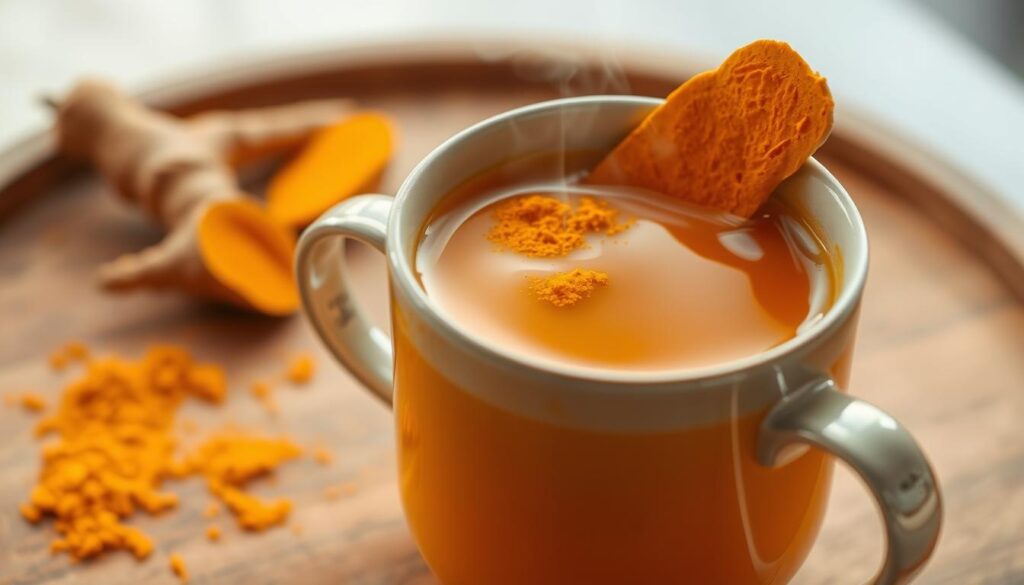
Harnessing the power of curcumin, turmeric tea provides a natural and effective way to boost mental clarity and focus. Turmeric, a spice celebrated for its medicinal properties, has been shown to improve memory and cognitive function, making it a valuable component in the fight against cognitive decline.
Curcumin’s Effect on Brain Health and Inflammation
Curcumin, the active compound in turmeric, has potent anti-inflammatory properties that play a crucial role in reducing neuroinflammation. This reduction in inflammation is linked to improved cognitive function and a decrease in brain fog. Studies have shown that curcumin can cross the blood-brain barrier, directly affecting brain health.
The anti-inflammatory action of curcumin supports better brain function by protecting against cognitive impairment. Research on curcumin’s neuroprotective properties suggests its potential in preventing age-related cognitive decline and neurodegenerative diseases.
Enhancing Bioavailability with Black Pepper
One of the challenges with consuming turmeric is the low bioavailability of curcumin. However, adding black pepper, which contains piperine, significantly enhances the absorption of curcumin’s beneficial compounds. This combination is crucial for maximizing the cognitive benefits of turmeric tea.
To make the most of turmeric tea, it’s recommended to add a pinch of black pepper. This simple addition can increase the bioavailability of curcumin by up to 2,000%, making the tea more effective in combating brain fog and improving cognitive clarity.
Delicious Turmeric Tea Recipes for Focus
There are several ways to prepare turmeric tea, each offering a unique flavor profile and cognitive benefits. Here are a few recipes to get you started:
- Golden Milk: Combine turmeric with warm milk (dairy or non-dairy), a pinch of black pepper, and a sweetener like honey for a comforting and cognitive-boosting drink.
- Turmeric-Ginger Blend: Mix turmeric with fresh ginger and lemon juice for a refreshing tea that enhances circulation and cognitive function.
- Turmeric Chai: Blend turmeric with black tea, cinnamon, cardamom, and ginger for a spicy and invigorating drink that promotes mental clarity.
When preparing turmeric tea, using a fat source like milk or coconut oil can further enhance the bioavailability of curcumin, making the tea even more effective.
The key to unlocking the full potential of herbal teas lies in understanding the optimal timing and preparation methods. To maximize their cognitive benefits, we need to consider both when we drink them and how we prepare them.
Optimal Timing for Herbal Teas
Different herbal teas have different optimal consumption times based on their properties. For instance, caffeinated teas like green tea and matcha are best consumed in the morning or early afternoon to boost focus and energy without interfering with sleep. On the other hand, calming herbs like lemon balm may be more beneficial in the afternoon when stress levels typically rise.
Understanding the caffeine content in your tea is crucial. Generally, it’s recommended not to exceed 3 cups of caffeinated tea per day. Non-caffeinated teas can be consumed more liberally, but it’s still important to be aware of any potential side effects specific to the brew.
Brewing Techniques for Maximum Benefits
The way we brew our tea can significantly impact its cognitive benefits. Factors such as water temperature, steeping time, and storage considerations all play a role in preserving the active compounds in herbal teas. For example, green tea requires a lower water temperature to prevent the destruction of its delicate antioxidants.
Consistency is also key. Regular intake of herbal teas often provides more significant cognitive benefits than occasional use. By incorporating herbal teas into our daily routine, we can enhance their benefits and make them a sustainable part of our lifestyle.
Creating a Mindful Tea Ritual
Creating a mindful tea ritual can further enhance the cognitive benefits of herbal teas. By dedicating a few moments each day to focus on the tea-drinking experience, we can reduce stress and increase attention. Whether we prefer our tea hot or as iced tea, the act of slowing down and savoring the moment can be incredibly beneficial.
In conclusion, by understanding the optimal timing, brewing techniques, and incorporating a mindful approach to drinking herbal teas, we can maximize their mental benefits and improve our overall well-being. Whether at work or during a break, making herbal teas a part of our daily routine can have a significant impact on our mental clarity and focus.

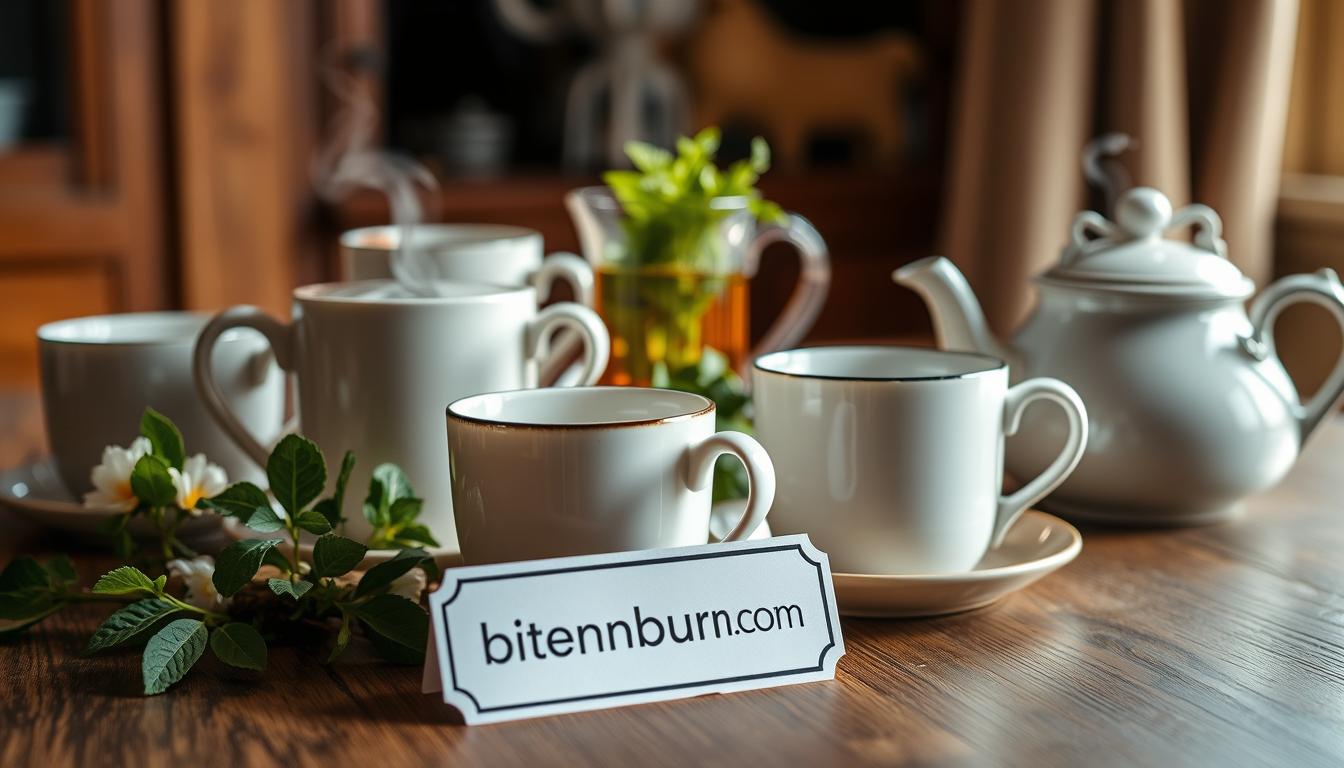
[…] will explore how morning routines can transform your day, and provide you with practical advice to revitalize your […]
[…] of adolescents globally experience mental health […]
[…] a mindful pause can help you reconnect with the present moment. By focusing on your breath and the sensations around you, you can create a sense of peace. This simple practice […]
[…] shows morning meditation slashes cortisol by 23%. Lower stress means sharper focus and fewer anxiety spikes. The University of Missouri found it also prevents decision fatigue, a […]
[…] is key to a strong immune system. Focus on the best foods for immune health to fuel your body’s defenses. Here’s how to build a diet […]
[…] through games and exercises can be a fun and effective way for adults and seniors to maintain mental acuity. Engaging in these activities not only enhances cognitive function but also contributes to a […]